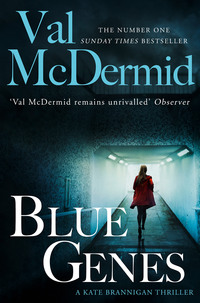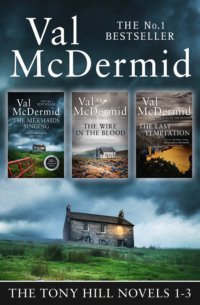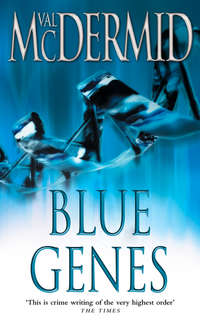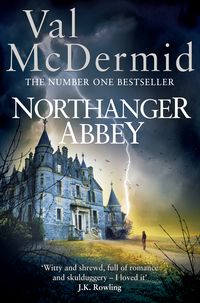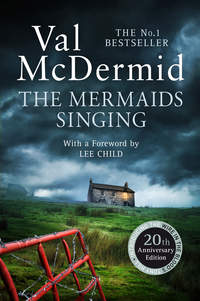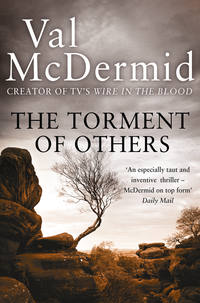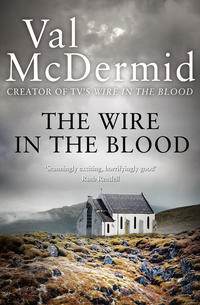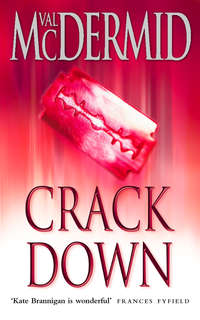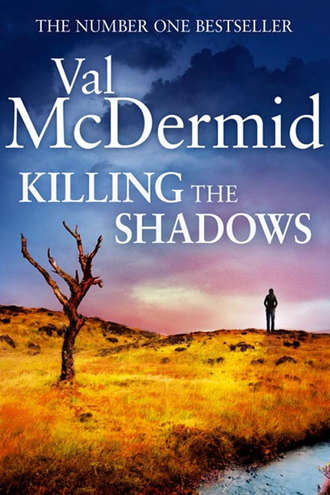
Полная версия
Killing the Shadows
Fiona dropped her bags and went into Kit’s ground-floor study to turn off the music. Blessed silence fell like balm on her head. She continued upstairs, stopping off in their bedroom to shuck off her walking gear and pull on her house clothes. She trudged up the remaining two flights to her office, feeling the hills in the pull of her leg muscles. The first thing she registered was the flashing light of the answering machine. Fifteen messages. She’d put money on them all being from journalists, and she wasn’t in the mood to listen to them, never mind to respond. This was one occasion where she was absolute in her determination not to provide a single quote that could be twisted to suit someone else’s agenda.
Leaving her laptop by the desk, Fiona noticed that Major Berrocal hadn’t wasted any time. A pile of paper lay accusingly in the fax tray. That she couldn’t ignore. Stifling a sigh, she picked it up, automatically straightening the edges, and headed back downstairs.
As Kit had promised, her dinner sat in the fridge. She wondered fleetingly how many of his fans would credit that the man who created scenes of graphic violence that gave critics nightmares was the same creature whose idea of relaxation after a hard day’s writing was to cook gourmet food for his lover. They’d probably prefer to believe he spent his evenings on Hampstead Heath, biting the heads off small furry animals. Smiling at the thought, Fiona poured herself a glass of cold Sauvignon while she waited for the risotto to heat up, then settled down at the kitchen table with the Spanish fax and a pencil. Glancing at the clock, she decided to catch the news headlines before she began the chore of deciphering foreign police reports.
The theme music of the late evening news thundered out its familiar fanfare. The camera zoomed in on the solemn face of the newsreader. ‘Good evening. The headlines tonight. The man accused of the Hampstead Heath murder walks free after a judge accuses the police of entrapment.’ Top item, Fiona noted without surprise. ‘Middle East peace talks are on the verge of breakdown in spite of a personal intervention by the US President. And the rouble tumbles as fresh scandal hits Russia’s banking system.’
The screen behind the newsreader’s head changed from the programme logo to a shot of the exterior of the Central Criminal Court. ‘At the Old Bailey today, the man accused of the savage rape and murder of Susan Blanchard was freed on the order of the trial judge. Mrs Justice Mary Delancey said there was no doubt that the Metropolitan Police had entrapped Francis Blake in an operation which she described as “little short of a witch-hunt”. In spite of the lack of any solid evidence against Mr Blake, she said, they had decided that he was the killer. Over to our Home Affairs Correspondent, Danielle Rutherford, who was in court today.’
A woman in her thirties with mouse-brown hair tangled by the wind gazed earnestly at the camera. ‘There were angry scenes in court today as Mrs Justice Delancey ordered the release of Francis Blake. The family of Susan Blanchard, who was raped and murdered as she walked on Hampstead Heath with her twin babies, were outraged at the judge’s decision and at Blake’s obvious jubilation in the dock.
‘But the judge was unmoved by their protests, saving her condemnation for the Metropolitan Police whose methods she described as an affront to civilized democracy. Acting on the advice of a psychological profiler, the police had set up a sting using an attractive female detective in an attempt to win Mr Blake’s affections and to lure him into confessing to the murder. The sting, which cost hundreds of thousands of pounds of the police operations budget and lasted for almost three months, did not lead to a direct confession, but police believed they had obtained sufficient evidence to bring Mr Blake to trial.
‘The defence argued that whatever Mr Blake had said had been at the instigation of the female detective and had been calculated to impress the personality she had falsely projected. And this view was upheld by the judge. After his release, Mr Blake, who has spent eight months in prison on remand, announced he would be seeking compensation.’
The picture changed, revealing a stocky man in his late twenties with cropped black hair and deep-set dark eyes. A forest of microphones and hand-held tape recorders blossomed in front of his white shirt and charcoal suit. His voice was surprisingly cultivated and he glanced down frequently at a piece of paper in his hands. ‘I have always protested my innocence of the murder of Susan Blanchard, and today I have been vindicated by a court of law. But I have paid a terrible price. I have lost my job, my home, my girlfriend and my reputation. I am an innocent man, but I have spent eight months behind bars. I will be suing the Metropolitan Police for false imprisonment and for compensation. And I sincerely hope they will think twice before they set about framing another innocent man.’ Then he looked up, his eyes blazing anger and hatred. Fiona shivered involuntarily.
The picture changed again. A tall man in a crumpled grey suit flanked by a pair of stony-faced men in raincoats walked towards the camera, head down, mouth drawn into a thin line. The reporter’s voice said, ‘The police officer in charge of the case, Detective Superintendent Steve Preston, refused to comment on Blake’s release. In a later statement, New Scotland Yard announced they were not actively seeking anyone else in connection with Susan Blanchard’s murder. This is Danielle Rutherford at the Old Bailey.’
Back in the studio, the newsreader announced that there would be an in-depth look at the background to the case after the break. Fiona turned off the TV. She had no need of their potted version of the facts. There were powerful reasons why she would never forget the rape and murder of Susan Blanchard. It wasn’t the graphic police photographs of the body or the pathologist’s report or her knowledge as a local resident of the scene of the crime, a mere twenty-minute walk from her own front door, although all of these had been terrible enough. Nor was it the brutality of a killer who had violated and stabbed a young mother in full view of her eighteen-month-old twin sons.
What made the Hampstead Heath murder so significant for Fiona was that it had marked the end of her association with the Met. She and Steve Preston had been close since their undergraduate days when they’d both read psychology at Manchester. Unlike most student friendships, it had persisted in spite of their very different career paths. And when British police forces had first started to consider the potential advantages of working with psychologists to improve their chances of catching repeat offenders, it had seemed the most natural thing in the world for Steve to consult Fiona. It had been the start of a fruitful relationship, with Fiona’s rigorous approach to data analysis complementing the experience and instincts of the detectives she had worked with.
Within hours of the discovery of Susan Blanchard’s body, it had been clear to Steve Preston that this was precisely the kind of case where Fiona’s talents could be used to best advantage. A man who could kill like this was no beginner. Steve had learned enough from listening to Fiona, supplemented by his own reading, to know that such a killer would already have cast his shadow over the criminal justice system. With her expertise, Fiona would be able to suggest at the very least what sort of record their suspect would have. Depending on the circumstances, she might well be able to indicate the geographical area he’d be likely to live in. She would look at the same things that detectives saw, but for her they would have different meanings.
Early in the investigation, Francis Blake had emerged as a possible suspect. He had been seen on the Heath around the time of the murder, running away from the direction of the dense undergrowth that shielded the small clearing where Susan Blanchard’s body had been found by a dog-walker who heard the children crying. Blake was branch manager for a firm of undertakers, which suggested to detectives that he had an unhealthy preoccupation with the dead. He had also worked in a butcher’s shop as a teenager, which the police decided meant he was comfortable with the sight of blood. He had no adult criminal record, although he had been cautioned twice as a juvenile, once for setting fire to a rubbish bin and the second time for an assault on a younger boy. And he was evasive about what he’d been doing on the Heath that morning.
There was only one problem. Fiona didn’t think Francis Blake was the killer. She said so to Steve and she kept on saying so to anyone who would listen. But her suggestions for alternative lines of inquiry had apparently led nowhere. Under the glare of an outraged media, Steve was under pressure to make an arrest.
One morning he’d turned up at her office at the university. She’d taken one look at the hard set of his features and said, ‘I’m not going to like this, am I?’
He shook his head and dropped into the chair facing her. ‘You’re not the only one. I’ve argued till I was blue in the face, but sometimes you just can’t buck the politics. The Commander’s gone over my head. He’s brought in Andrew Horsforth.’
Neither of them needed to comment. Andrew Horsforth was a clinical psychologist. He had worked for years in a secure mental hospital whose reputation had slumped with every independent report ever made into it. He relied on what Fiona contemptuously referred to as the ‘touchy-feely’ approach to profiling, priding himself on the quality of insights gained from years of hands-on experience. ‘Which would be fine if he could ever see past his own ego,’ she’d once commented sarcastically after listening to him lecture. He’d had what she privately referred to as a lucky break on the first major case where he’d produced a profile and he’d traded on it ever since, never failing to provide the media with all the quotes and interviews they could desire. When police made an arrest on a case where he’d produced an offender profile, he was always quick to claim the credit; when they failed, it was never his fault. Faced with Francis Blake as a suspect, Fiona felt certain Horsforth could make the profile fit the man.
‘I’m out of it, then,’ she said with an air of finality.
‘Believe me, you’re well out of it,’ Steve said bitterly. ‘They’ve decided to ignore your professional advice and my personal opinion. They’re going ahead with the sting. Orchestrated by Horsforth.’
Fiona shook her head in exasperation. ‘Oh, for fuck’s sake,’ she exploded. ‘It’s a terrible idea. Even if I thought Blake was your man, it would still be a terrible idea. You might just get something that would stand up in court if you used a trained psychologist with years of experience of therapeutic work to do the entrapment, but with the best will in the world, setting some young copper loose with an idiot like Horsforth briefing her is a recipe for disaster.’
Steve ran his hands through his thinning dark hair, pushing it back from his forehead. ‘You think I haven’t told them that?’ His mouth clamped shut in a frustrated line.
‘I’m sure you have. And I know you’re as pissed off about it as I am.’ Fiona got to her feet and turned to look out of the window. She couldn’t bear to show her humiliation, even to someone as close as Steve. ‘That’s it, then,’ she said. ‘I’m finished with the Met. I’m never going to work with you and your colleagues again.’
Steve knew her well enough to realize there was little point in trying to argue when she was in this frame of mind. He’d been so angry at the dismissal of his own professional judgement that the thought of resignation had briefly flashed across his mind. But unlike Fiona, he had no alternative career where his expertise could make a difference, so he’d tossed the notion aside impatiently as the self-indulgence of hurt pride. He hoped Fiona would do the same, given time. But this wasn’t the moment to suggest that. ‘I can’t blame you, Fi,’ he said sadly. ‘I’ll be sorry to lose you.’
Composed again, she faced him. ‘I’m not the only one you’ll be saying sorry to before this is over,’ she’d said mildly. Even then, she’d understood how badly things could turn out. Police officers desperate for an arrest, shored up by the seeming respectability of a psychologist who told them what they wanted to hear, would not be satisfied till they had their man behind bars.
It gave her no pleasure at all to see how right she’d been.
3
The medieval stronghold of Toledo was built on a rocky outcropping almost completely enclosed by an ox-bow gorge in the River Tagus. The deep river and the steep cliffs provided natural defences for most of the city, leaving only a narrow neck of land to fortify against the enemy. Now a scenic road ran round the far bank of the Tagus, providing panoramic views of a tumble of buildings the colour of honey in the sun, descending precipitously from the ornate cathedral and the severe lines of the Alcazar. This much Fiona remembered from a hot dusty day thirteen years before when she’d explored the city with three friends.
They’d been celebrating the completion of their doctorates by touring Spain in a battered Volkswagen camper, ticking off the major sights and cities as they went. Toledo had meant El Greco, Fernando and Isabella, shop windows filled with armour and swords, and a particularly delicious way of serving quail, she recalled. If anyone had suggested to that young academic psychologist that she’d be returning one day as a consultant to the Spanish police, she’d have wondered what hallucinogenics they’d been on.
The first body had been found in a deep wooded gorge running down to the River Tagus about a mile from the city gates. According to local custom, the gorge boasted the revolting name of La Degollada—the woman with her throat slit, according to Fiona’s Spanish dictionary. The original corpse in La Degollada was said to have been a gypsy woman who seduced one of the guard, allowing a sneak attack to take place on the city. Her punishment for losing her head over a soldier was literally to lose her head. Her throat was cut so severely that she was virtually decapitated. Fiona noted with weary lack of surprise that Major Berrocal’s brief did not record the fate of the soldier.
The contemporary victim was a twenty-five-year-old German citizen, Martina Albrecht. Martina worked as a freelance tour guide, leading organized German-speaking parties round Toledo. According to friends and neighbours, she had a married lover, a junior officer in the Spanish Army who was attached to the Ministry of Defence in Madrid. He had been at an official dinner in the capital forty-odd miles away on the night of the murder. They were still drinking coffee and brandy at the time Martina’s body had been discovered, so there was no question of him coming under suspicion. Besides, Martina’s friends reported that she was perfectly happy with the part-time nature of their relationship and had said nothing to indicate there were any problems between them.
The body had been found just before midnight by a teenage courting couple who had parked their motorbike by the road and climbed down into the gorge to escape from prying eyes. There was also no question of any suspicion attaching to them, although the girl’s father had reportedly accused the boyfriend of being perfectly capable of murder on the grounds that he was planning to debauch an innocent young girl.
According to the crime-scene reports, Martina had been sprawled on her back in the moonlight, arms thrown wide, legs spread. The pathologist revealed that her throat had been cut from left to right, probably from behind, by a long and very sharp blade, possibly a bayonet. It was hard to be precise, however, and since Toledo is famous for its steel, the purchase of razor-edged knives was an everyday occurrence in each of the dozens of tourist shops that lined the main streets. Death had been swift, blood pumping forwards from the severed carotid arteries in a pair of gushing fountains. Her clothing was drenched in blood, indicating that she had been standing rather than lying when the wound had been inflicted.
Further examination revealed that a broken wine bottle had been thrust repeatedly into her vagina, shredding the tissue. The relative absence of blood at the site indicated that Martina had been mercifully dead by then. The bottle had once contained a cheap Manchegan red wine, available in almost any local shop. The only other item of interest at the scene was a bloodstained guide to Toledo in German. Martina’s name, address and phone number were scribbled on the inside cover in her own handwriting.
There were no significant forensic traces, nor any indication of how Martina had been brought to La Degollada. It was not a difficult place to access; the panoramic route round the Tagus actually crossed the gorge, and there were plenty of places nearby where a car could be tucked off the road. According to the woman with whom she shared an apartment near the station, Martina had come in from work around seven. They’d eaten a snack of bread, cheese and salad together, then the flatmate had left to meet a group of friends. Martina had had no firm plans, saying only that she might go out for a drink later. Officers had canvassed the cafés and bars she usually visited, but nobody had admitted seeing her that evening. The members of the tour she had led the previous day had been questioned when they’d arrived in Aranjuez the following day, but none of them had been aware of any of their fellow tourists taking any particular notice of their young guide. Besides, they’d all spent the evening together at a flamenco fiesta. Everyone was vouched for by at least three other members of the party.
In the absence of any firm leads, the investigation had ground to a halt. It was, Fiona thought, the sort of frustrating inquiry typically provoked by the first crime in a series where the offender was intelligent enough to know how to cover his tracks and had no ambivalence about being caught. Without any obvious connection between victim and killer it was always difficult to identify worthwhile avenues of investigation.
Then, two weeks later, a second body had turned up. A relatively short interval, Fiona noted. This time, the scene of the crime was the vast monastery church of San Juan de los Reyes. She remembered the cloisters, a massive quadrangle festooned with absurd gargoyles. It was there, she reminded herself, that one of their group had spotted the bizarre image of a reverse gargoyle—instead of a grotesque face adorning the water spout, this statue consisted of a body from the waist down, as if its owner had been rammed head first into the wall.
The unique feature of the church itself was the array of manacles and shackles that hung along its facade. They were the very shackles the Moorish conquerors used to chain up the Christian prisoners taken at Granada, and when Fernando and Isabella’s vast army captured Granada from the Moors, the monarchs decreed the chains should be hung on the church as a memorial. Fiona remembered vividly how bizarre they had looked, hanging black in the sunlight against the golden stone of the ornamented facade.
The second victim was an American graduate student of religious art, James Paul Palango. His body had been discovered at dawn by a street cleaner who had been sweeping alongside the monastery cloisters of San Juan de los Reyes. He’d turned the corner on the paved area in front of the church when his eye had been caught by something above his head. Palango was hanging suspended from two sets of manacles. In the puffy flesh of his neck, something glinted in the early morning light. When the body was lowered to the ground, it became clear that he’d been strangled with a dog’s choke chain then attached to the manacles with two pairs of handcuffs. The pathologist also reported that Palango’s corpse had been repeatedly sodomized with the broken neck of a wine bottle, which remained inside his torn rectum. Again, there appeared to be no significant forensic traces. Interestingly, in Palango’s pocket there was a guide to Toledo.
Police inquiries revealed that Palango was an evangelical Christian from a wealthy Georgia family. He had been staying at the parador which perched on a high bluff looking across the river to the city. According to the hotel, Palango had eaten an early dinner then gone out in his hired car sometime around nine o’clock. The car was later discovered in a parking garage opposite the Alcazar. Extensive questioning in the neighbourhood revealed that the American had taken coffee in the Plaza de Zocodover at the heart of the old town, but in the general melee of the evening paseo no one had noticed when he had left the café or whether he’d been alone. No one had come forward to say they’d seen him since.
Fiona leaned back in her seat and rubbed her eyes. No wonder Major Berrocal was so keen to enlist her help. The only significant information the police had gleaned from the second murder was that the killer was physically powerful enough to carry a ten-stone man up a ladder, and that he was bold enough to display his victim in a public place. In a handwritten note, Major Berrocal had pointed out that once the nearby café had closed in the early hours of the morning, the area around the church was quiet and although it was overlooked by several houses, the killer had chosen the farthest point of the facade for his exhibition, where he would be least likely to be spotted.
She leaned back in her chair and stretched her arms above her head while she contemplated the information she’d laboriously worked her way through. It was professionally intriguing, no question of that. What she needed to consider was whether she could offer anything constructive to the investigation. She had worked with European police forces on several occasions, and had sometimes felt handicapped by her lack of visceral understanding of how their societies worked. On the other hand, she already felt the faint stirrings of an idea of how this killer operated and where the police might start their search for him.
One thing was certain. While she dithered, he would be planning his next murder. Fiona refilled her glass and made her decision.
4
Fiona was halfway downstairs with the Rough Guide to Spain when she heard the front door opening. ‘Hello,’ she called out.
‘I brought Steve home with me,’ Kit replied, his voice relaxed into broad Mancunian by alcohol.
Fiona was too tired to welcome the prospect of late-night drinking and chat. But at least it was only Steve. He was part of the family, too well-rooted in their company to mind if she took herself off to bed and left them to it. She rounded the final turn in the stairs and looked down at them. The most important men in her life, they were an oddly contrasting pair. Steve, tall, wirily thin and dark; Kit, with his broad, heavily muscled torso making him look shorter than he was, his shaved head gleaming in the light. It was Steve, with his darting eyes and long fingers, who looked like the intellectual, while Kit looked more like a beat bobby who worked as a nightclub bouncer on the side. Now, they looked up at her, identical sheepish small-boy grins on their flushed faces.
‘Good dinner, I see,’ Fiona said dryly, running down the rest of the stairs. She stood on tiptoe to kiss Steve’s cheek, then allowed Kit to engulf her in a hug.
He gave her a smacking kiss on the lips. ‘Missed you,’ he said, releasing her and crossing to the kitchen.
‘No you didn’t,’ Fiona contradicted him. ‘You’ve had a great boys’ night out, eaten lots of unspeakable bits of dead animals, drunk’—she paused and cocked her head, assessing them both—‘three bottles of red wine…’
‘She’s never wrong,’ Kit interjected.
‘…and put the world to rights,’ Fiona concluded. ‘You were much better off without me.’
Steve folded himself into a kitchen chair and accepted the brandy glass Kit proffered. He had the air of a man embattled who warily senses he might finally have arrived in a place of safety. He raised his glass in a sardonic toast. ‘Confusion to our enemies. You’re right, Fi, but for the wrong reasons,’ he said.


